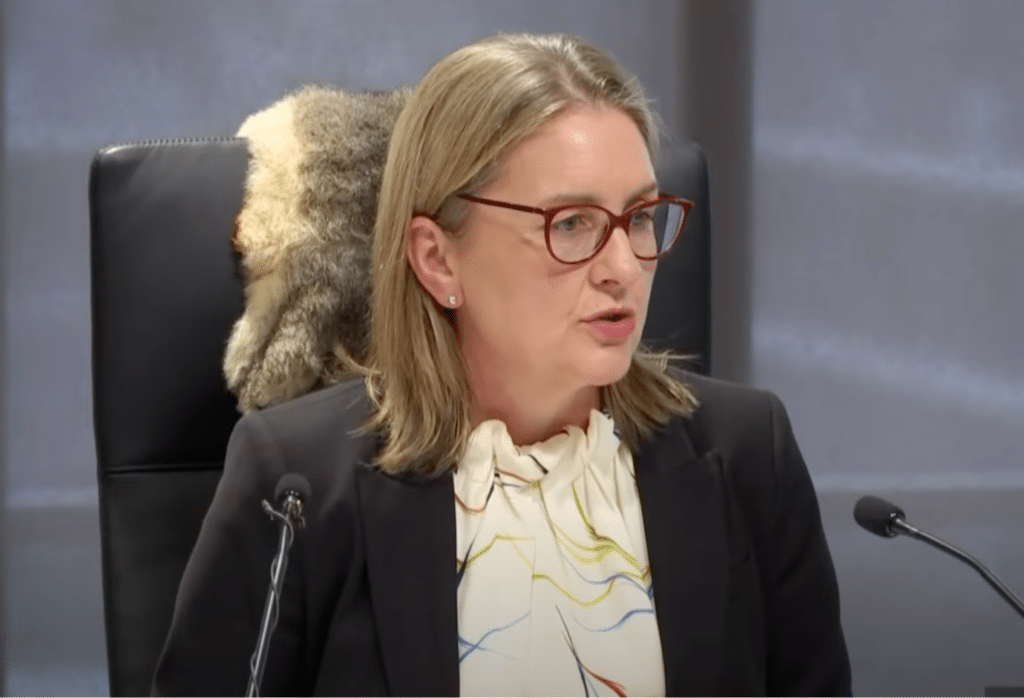On Monday, Victorian Premier Jacinta Allan made a historic appearance at the state’s Indigenous truth-telling inquiry, vowing to “present the facts” about the inequalities faced by the First Nations people in Victoria’s history.
The Yoorrook Justice Commission, an Indigenous-led truth-telling inquiry that holds the same powers as a royal commission, began holding public hearings this week.
The inquiry aims to investigate land injustices and create a public database of the systemic injustice experienced by First Nations people in Victoria since colonisation, including existing inequalities. Ultimately, its findings will help inform Victoria’s treaty process.
Allan began her almost three hour-long appearance at the inquiry with a statement, admitting that the policies and practices of previous governments had led to a widening gap between Indigenous and non-Indigenous Victorians.
“There is an unbroken line between the dispossession and violence of the past and the lives of First Peoples today,” she said.
“Whether ignorance or deliberate intent, we have driven that disparity … and that disparity continues to play out in the lives and life outcomes of Aboriginal people. Acknowledging that ongoing injustice demands an honest recognition that despite efforts and intentions, we still have a long way to go.”
Allan described the record of Victoria’s history as “incomplete” and acknowledged that a greater understanding of the past is essential.
“Truth matters to our past, our present and to our future,” she said.
“Many Victorians’ … education of Aboriginal peoples’ histories and experiences was limited. […] that limitation was not an accident, an oversight, or absent-mindedness. It was part of a deliberate and systematic attempt to erase First Nations people from our state’s history. The process of truth-telling is a refusal to submit to that silence.”
“The record this commission will hand down will mean at long last, the truth of our state’s history is told. The murder, the massacres, the dispossession of culture and Country. The land taken away, the way of life destroyed, the children who never came back home, and those who are still trying to find their way back.”
“It’s not enough to merely know this history. We do need to learn from it, and we do need to act on it, too …”
“That history continues to live on in our present.”
Yoorrook chair Eleanor Bourke interrogated Allan on a number of issues, including the dispossession of Indigenous land, the exclusion of Indigenous people from state resource revenues, the discharge of self-determination principles in government and adding truth-telling into the state school curriculum.
“Your words will live on the public record for generations to come,” Bourke, a Wergaia/Wamba Wamba elder, warned the premier.
“When you leave here today, I ask you to live up to your words and actions. First Peoples have faced a long history of being let down by successive governments and their leaders. Broken promises, unfulfilled commitments and apologies followed by inertia.”
During her appearance, Allan also acknowledged that First Peoples’ sovereignty had never been ceded to colonial settlers or governments, saying their “ties to land and waters … can never be extinguished.”
Regarding the implementation of the principles of true self-determination needed to set up a meaningful treaty, Allan insisted that deep structural change within government was needed to challenge the views of people “in our government systems”.
“In shining a light on how our state was settled, we can genuinely start to work towards better outcomes and that is part of the outcomes of treaty,” she said.
“This is a process and a journey that is not about one in particular individual, it’s about addressing the historic wrong of the way land was not ceded, how that dispossession has carried through to the present day and caused so much disadvantage. My determination in terms of the part that I will play in this process is that we achieve treaty outcome here in Victoria.”
“The time, in terms of when that will happen, that is for our treaty negotiators to come together and determine that.”
Allan also admitted that when she learnt about colonial massacres, she felt “shame and distress”.
“I was sitting there, in my backyard, reading through the materials and just felt so distressed that these were massacres that occurred not far from where I was sitting and I didn’t know about them. Growing up and living as I have all my life in central Victoria, on Dja Dja Wurrung country, I did not know about the massacres that occurred so close to home.”
“And that distress carries with me today. It brings me a sense of shame and distress personally that I did not know that, and it brings me a sense of shame and distress that this was done by people, all in the pursuit of taking land off First Peoples. As an extension of that … to know that the consequence of that was the impact of death and dispossession for First Peoples going forward.”
When deputy chair and Kerrupmara/Gunditjmara man Travis Lovett addressed Allan, saying: “Our people have been saying this for 200 years, what really happened to us,” the premier replied, “It’s not that I, before my appearance today, was not aware of the dispossession and disadvantage and the wrongs that occurred at that point that the nation and then the state was colonised. My learning was deepened and expanded in terms of the brutality.”
“That was the area that was particularly concerning to me that I hadn’t learnt of that, the depth and the extent of the brutality that went on as part of that.”
Earlier this month, the government released its response to an interim report, accepting just four recommendations fully and 24 in principle.
Several Indigenous leaders criticised the government’s response, saying that tougher policies were needed on reform before treaty negotiations could start.
Yoorrook is due to deliver its final report by mid-2025 which will include recommendations for reform.


